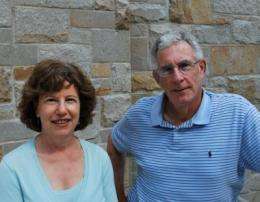NIH grant advances Tay-Sachs disease gene therapy

In a victory for families who dug into their own pockets to fund new research, the National Institutes of Health has awarded a $3.5-million grant to the Boston-based Tay-Sachs Gene Therapy Consortium to prepare a gene therapy for human clinical trials in a bid to halt the fatal genetic disorder.
With a plan to initiate human trials within four years, the NIH award was eagerly awaited by Tay-Sachs families and their supporters, who raised nearly $600,000 to assemble the international consortium of experts and help maintain its research agenda while scientists worked to secure federal funding. The NIH grant will help advance the gene therapy from animal tests to human clinical trials.
"The consortium has been held together with funds raised by people affected by this terrible disease," said Boston College Professor of Biology Thomas Seyfried, whose lab is part of the consortium. "People were pounding the pavement raising money. It was critical to our work and for these families, who have lost children, who have a vested interest in this research."
In addition to the Seyfried lab, the consortium includes University of Massachusetts Medical School professor and project manager Miguel Seña-Esteves, Dr. Tim Cox, University of Cambridge (U.K.), Dr. Florian Eichler, Massachusetts General Hospital, and Auburn University Professor Doug Martin.
"We see this as a tremendous achievement," said Susan Kahn, executive director of the Boston-based National Tay-Sachs and Allied Diseases Association, which made establishing the consortium a top research priority. "Without the initial funding from families and donors, we might never have seen this day come. While we know much work lies ahead, the potential success of this gene therapy effort can ultimately go way beyond Tay-Sachs to other diseases that affect the brain."
A fatal genetic disorder most often found in children of Eastern European Jewish descent, Tay-Sachs typically claims its victims before they reach age 5. There are variants that affect children of Irish and French-Canadian descent as well. While genetic screening has greatly reduced deaths from Tay-Sachs, approximately 25-30 individuals die from the disease annually.
Infants can show signs of the disease as early as six months, cease meeting developmental milestones, and then begin to lose motor skills. Children affected by juvenile onset show signs after age three and quickly begin to regress physically and mentally. Most children do not survive past age 5. For adults afflicted by late onset Tay-Sachs, symptoms are often confused with mental illness or other diagnoses.
Tay-Sachs disease creates an enzyme deficiency that allows harmful quantities of a fatty substance, or lipid, to build up in the nerve cells of the brain, resulting in a relentless deterioration of mental and physical abilities. Consortium researchers say their therapy will battle the disease at the cellular level.
The consortium was formed two years ago as researchers refined a viral vector injection capable of delivering two human genes - known as HexA and HexB - which are deficient in Tay-Sachs. Injection of cells in the brain through two individual vectors has been shown in laboratory mice to spur production of normal enzyme at levels sufficient to correct the enzymatic deficiency throughout the entire brain of these subjects. Consortium researchers have successfully paired the two genes in a single vector, which they believe will result in increased therapeutic efficiency and lower production costs.
The consortium received grants through the National Tay-Sachs and Allied Diseases Association's Research Initiative, which raised the majority of the funds through family foundations: The Cure Tay-Sachs Foundation, the Cameron and Hayden Lord Foundation, the Mathew Forbes Romer Foundation, the Pesotchinsky Family Fund, the Hoffman Family Fund and the Ungerleider Family Fund.
Seyfried's lab at Boston College has been researching Tay-Sachs for 30 years. Five years ago, Seyfried reported tests in mice showed a drug could block the accumulation of fatty substances in the brain. That drug was a small, artificial amino sugar molecule that blocked the initial steps of the disease.
Source: Boston College